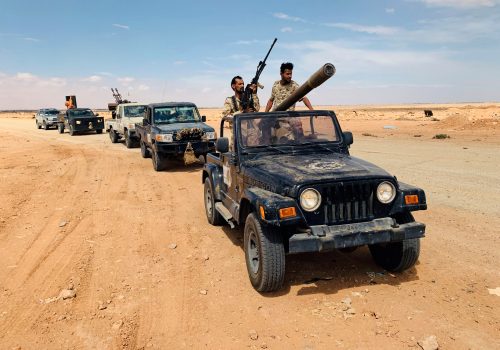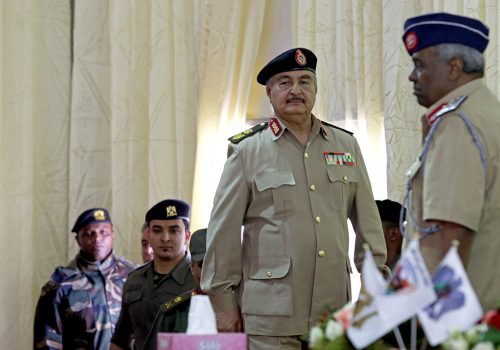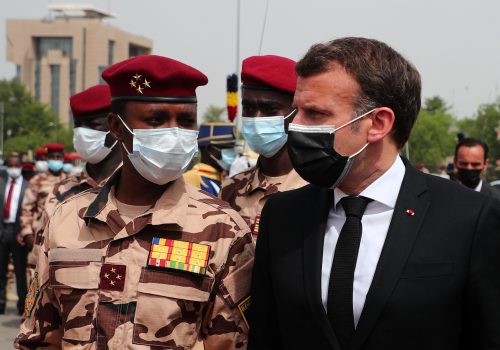Libya has a mercenaries problem. It’s time for the international community to step up.
A couple of weeks after a state institution in Tripoli was stormed by gunmen and a suicide bomber in 2018, I was sitting in a Tunis café with a friend who had been working in the building on the day of the terrorist attack. Aymenn believed that the suicide bomber was wandering the premises in the run-up to the tragedy and had walked by his desk. He described a beatific smile on the man’s face. “He was drugged up in some way,” Aymenn said. “And this is the thing that kept running through my head: He definitely wasn’t Libyan.”
One of the darker realities of the war in Libya is that the conflict (now in its eleventh year) is powered by layers of actors from outside the contested territory. Libyans have been killed and their country ravaged by foreign soldiers of fortune. Both rival blocs in Libya—the internationally-recognized government in Tripoli and the self-styled Libyan National Army (LNA) based in the east—have recruited from sub-Saharan Africa. The LNA, in particular, has addressed its manpower shortage through thousands of mercenaries from Chad and Sudan, including feared militia groups from Darfur who, according to the United Nations (UN), were “seeking to increase their presence in Libya in pursuit of profit.”
More significantly, state-level actors have made little effort to conceal their enthusiasm for a mercenary-led model of proxy warfare in Libya. It is an open secret that one of the main levers of support from Russia to the LNA is a two thousand-strong mercenary contingent from the Wagner Group, a Kremlin-backed private security company. Its head, Yevgeny Prigozhin, was seen in a video with the LNA’s leader, General Khalifa Haftar, during an official meeting in Moscow in October 2018—the same month Wagner installed itself in Libya. The United Arab Emirates (UAE) allegedly also has direct and regular contact with Sudanese mercenary groups, which it equips and pays. For its part, Turkey has transported as many as eighteen thousand Syrians to fight for the Tripoli-based forces in Libya, reportedly offering a salary of $2,000 a month (later changed to $600) and the promise of Turkish citizenship, though the country has a strict citizen policy.
Another major effort involved mercenaries from South Africa, the United States, the United Kingdom, and Australia linked to Blackwater founder, Erik Prince, and run through UAE-based companies. The operation aimed to supply the LNA with aircraft and intelligence support and neutralize high-value targets, but it was aborted in June 2019. Haftar had become angry at the sub-standard kit that was delivered and the foreign operatives hastily evacuated from Benghazi to Malta on inflatable boats.
When faced with an unprecedented revolt against his forty-one-year rule in 2011, Libyan dictator Muammar Gaddafi relied heavily on mercenaries from sub-Saharan Africa in his repression, bestowing them with identity cards that stated: “I am here to protect the King of Kings.” Gaddafi had also long employed Tuareg fighters from Mali and Niger as the backbone of his elite security corps and so-called ‘Islamic Legion’. After his downfall, many of these heavily armed and well-trained combatants returned to Mali, re-igniting the Tuareg separatist rebellion. In 2012, they seized large tracts of territory in the north and declared an independent state. However, almost immediately Tuareg fighters’ gains were violently usurped by jihadist factions, tipping the north of the country into war and prompting a military intervention from France in 2013.
Similarly, the Chadian rebels who killed President Idriss Déby on April 20 were based in Libya, where they amassed money, arms, and battlefield experience as guns-for-hire. Since 2019, they fought alongside Haftar’s LNA, garrisoning with Wagner forces at the Jufra air base and earning access to advanced weaponry, some of which was allegedly supplied by the UAE. As a ceasefire came into effect in Libya in October 2020, groups of these fighters returned home, touching off another round of rebellion that was quickly energized by the slaying of Déby as he inspected troops in northern Chad.
While these experiences demonstrate the radioactive spread of conflict through mercenaries and knowledge transfers of the most destabilizing kind, the casual escalation of mercenary use in Libya also points to the weakening of a once robust international norm.
As scholar Sarah Percy has demonstrated, mercenary use waned after the mid-nineteenth century and the practice was considered profoundly objectionable from the 1960s onwards. The norm against mercenaries emerged from the idea that they lie beyond the control of the state, thereby posing “a practical threat to states and a threat to the normative idea that states ought to have a monopoly on the use of force.” Furthermore, mercenaries are driven by financial motivations and therefore “do not fight for a cause deemed by society to be appropriate.” According to Percy, beginning in the early 1960s, there were more than one hundred UN General Assembly resolutions condemning mercenaries. Furthermore, where funding for mercenaries may have existed, that support was in secret: “there was no attempt to hire mercenaries openly.”
The normalization of mercenary use in Libya takes place in the context of major, state-level foreign interference. Indeed, as UN Special Envoy to Libya, Ghassan Salame, argued in 2019, external investment in Libya risked surpassing national involvement. Despite a UN arms embargo, Turkey, Russia, and the UAE have reportedly transferred to Libya surface-to-air missile batteries, fighter aircraft, battle tanks, armed drones, military advisers, professional soldiers, disinformation capabilities, and anti-aircraft artillery systems—and these states control their own military bases there. Leaving to one side the question of mercenaries, the troubling moral implications of this level of outside support have been laid bare in numerous incidences of young Libyans being killed on home soil by extraterritorial parties. In one event, twenty-six unarmed cadets were killed at a military academy in Tripoli by a Chinese Blue Arrow missile fired from a Wing Loong II drone likely operated by the UAE.
The UN has repeatedly called for foreign powers to end their excessive interference in Libya to little effect, and the October 2020 ceasefire agreement included a clause on the withdrawal of all mercenaries and foreign fighters from Libya within three months. The deadline was ignored by Russia and Turkey, with the latter seemingly intent on deepening its presence at the Watiya air base west of Tripoli and possibly expanding it eastwards to the Misrata naval base. A UN panel of experts reported in March that, notwithstanding the ceasefire agreement, there had been no indications of withdrawal by the Russian Wagner Group. On April 29, an informal UN Security Council (UNSC) meeting was called by three African members—Kenya, Nigeria, and Tunisia—to discuss ways of repatriating the more than twenty thousand mercenaries and foreign fighters who remain in Libya. However, some UNSC members pointed out that other council members in the room were driving the problem.
For Aymenn, the foreign origins of the suicide bomber seemed to imbue the assault on his workplace with an added layer of violence. As scholar James Pattison describes it, being a mercenary and using mercenaries is seen as one of the worst moral failings in conflict. Mercenaries themselves sometimes recognize this wrongdoing. One Sudanese commander explained to the Guardian newspaper in 2019: “I know that we are mercenaries and we are not fighting with honor and dignity…but this is temporary, we will go back home after we are done with our mission here.” The homecoming the commander plans involves returning to Sudan to fight the post-Omar al-Bashir transitional government—an important reminder that private armies impact international order.
While the conflict in Libya is not a policy priority for the Joe Biden administration, it is clearly in US interests to forcefully champion the immediate withdrawal of all mercenary and foreign fighters in Libya. The eviction of mercenaries would come with a second-order geopolitical advantage for the Biden administration, which already views developments in Libya through the prism of competition with Russia. The reality is that most of the Russian presence in Libya is mercenary. Thus, the departure of all mercenaries from Libya would deny Russia its current posture at the southern doorstep of Europe.
Alongside the oft-heard argument about the impact of mercenaries on the stability of Libya and the region, the Biden administration should also make the moral case against the use of mercenaries, contributing to the rescue of an important international norm. Not only does mercenary use sustain itself through the exploitation of vulnerable young men desperate to provide for their families, but it leads to the marketization of conflict in a way that fundamentally destabilizes some of our most deep-seated ideas about the ethics of war, including what cause it is legitimate to fight for, under what authority, and with what motivation.
If the crisis of foreign mercenaries in Libya is not soon settled, the future of its citizens will remain hostage to political and military forces from far beyond their borders. There is also the very real possibility that, with such open sponsoring of guns-for-hire and no response from the international community to match, the norm against mercenary use will be reversed and nineteenth-century practices will be gradually reinstated. Given that the resolution of the mercenary file in Libya will have implications for the future of international relations, we must all share concern.
Dr. Alia Brahimi is a specialist in the politics of the Middle East and North Africa. She is also a former research fellow at Oxford University and the London School of Economics.
Image: Africans suspected of being mercenaries and detained by anti-Gaddafi fighters on the outskirts of Sirte, wait to be questioned, at a base in Herawa town, around 70 km (43 miles) east of Sirte, September 28, 2011. Intense sniper and artillery fire from pro-Gaddafi fighters has so far prevented National Transitional Council (NTC) forces from taking Sirte despite more than two weeks of fighting and two full-on assaults. One of Muammar Gaddafi's last two bastions, it has withstood a siege, NTC tank and rocket fire as well as NATO air strikes, and the United Nations and international aid agencies are worried about conditions for civilians trapped inside. REUTERS/Asmaa Waguih


